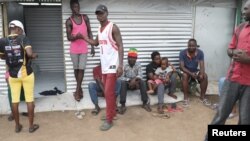LGBTQ refugees in Kenya's Kakuma refugee camp say they are subjected to violent attacks and destruction of property by other refugees and local Turkana people. Some have fled to Nairobi and accuse authorities of failing to prevent the attacks.
In a June video shared with a reporter, a crowd of people surround a group of LGBTQ refugees in Kenya’s Kakuma Refugee Camp and thrash them with stones and sticks.
Photos of bloodied LGBTQ refugees circulated on social media.
Transgender Ugandan refugee Doreen Andrews Kigongo was in the camp that day and confirmed the authenticity of the video.
Kigongo was among a group of LGBTQ refugees who were transferred to Kakuma in late 2019, after her Nairobi safe house was raided by police.
“I’m coming there in December, and other people told me, ‘Oh my god, you are going to die here," she said. "First of all, you’re trans. And you want to live that life, where you’re expressing as a trans person?’”
Another transgender Ugandan refugee, Anita Sebuuma, was among those attacked in the video and says that police were called but took hours to arrive.
At a safe house in Nairobi, Sebuuma shows a reporter a long belly gash and scalp and forehead scars.
Sebuuma said the wounds are from previous attacks by other refugees and locals who don’t want them in the camp.
Sebuuma said after a while, people got to know the house where they lived and started coming both day and night, throwing stones and threatening to kill them.
But East Africa’s LGBTQ refugees have few options.
Kenya is the only country in the region that accepts LGBTQ refugees but, homosexuality is still illegal and punishable by up to 14 years in prison.
Refugees and asylum seekers are required to stay in camps with exemptions given only on a case-by-case basis.
Just days after the June attack, the United Nations refugee agency (UNHCR) released a statement saying Kenyan authorities were sending five LGBTQ refugees in Nairobi back to Kakuma.
The five had been moved out of the camp in 2018 over threats to their safety.
The spokeswoman for UNHCR Kenya, Eujin Byun, said they have attempted to organize dialogue between refugees and community leaders.
“We have to find a solution, even temporarily. Because this violence is not acceptable. And for UNHCR, their well-being is the priority,” she said.
But LGBTQ refugee Kigongo notes if homophobic violence could be solved through talks, she would not have had to leave Uganda.
Craig Paris is the executive director for the Refugee Coalition of East Africa. He said that few LGBTQ refugees stayed in camps until just a few years ago.
Police raids on safe houses increased, he said, and LGBTQ refugees demanded protection.
“But the problem came with visibility and security—general security around queer refugees—and, you know, the host community being homophobic itself,” he said.
Activists helped some of the LGBTQ refugees attacked in June get to safe houses in Nairobi.
But an estimated 300 LGBTQ refugees remain in Kakuma, where few of them feel welcome or safe.





